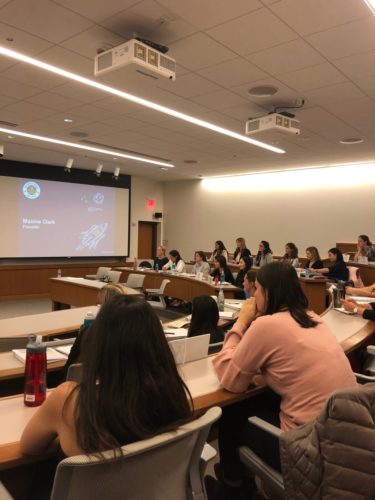Maxine Clark, founder of St. Louis-based Build-A-Bear Workshop, kicked off the semester’s first Women & Leadership class with a story of her childhood. This is a selection of my three takeaways from her talk.
It’s OK to make mistakes
Clark explained that her first-grade teacher, Mrs. Grace, was responsible for imparting a lesson Maxine has carried with her throughout her life: “Learn from your mistakes.” Every Friday, Mrs. Grace would hand out a red pencil to the student that made the most mistakes that week. Maxine Clark noted the uniqueness that for once it wasn’t the brightest or quickest student that was rewarded, but one that had made mistakes.
Taking this lesson forward, Clark was pleased to see that the retail industry also embraced mistakes. At her very first job in the executive training program at the May Company, she had the responsibility of marking down prices with a very similar red pencil. She thought, “Wow, I’m made for this job!”
As a student, whose value is measured often by test scores and grades, it’s refreshing to remember that making mistakes leads to growth. Looking around the classroom, I saw many young women also relieved by the idea that mistakes can lead to success. Clark’s words came at an important time as many of us are soon graduating and starting a new life chapter.
 Know what you don’t know
Know what you don’t know
Clark proudly admits, “One of my strengths is I know what I don’t know.” This acknowledgment helped her snag one an incredible promotion. As a new employee for the May Company, she was tasked with the job of traveling to Asia to pick out products for all of the May Company stores. Maxine knew immediately that she didn’t know what the other stores would need.
Without the support of her supervisor, she had to take it upon herself to travel to the Pittsburgh store to see their assortment. There, she ran into David Farrell, who would soon become the CEO. Impressed with her initiative, he continued a professional relationship, eventually promoting Clark to chief of staff. Knowing what she didn’t know both allowed her to prove self-initiative and feel comfortable asking for help.
Enjoy the journey

Clark emanates passion. With exuberance, she described every project she was involved in. She ascribes much of her success to her passion and her ability to “enjoy the journey.” Starting with Build-A-Bear, she felt that she could pour all of her energy into the company’s success and growth because she felt so passionate. Today, she invests her energy in projects surround education, women in business, and the St. Louis community.
Pictured above: Maxine Clark, founder of the Build-A-Bear Workshop, speaking in 2013 during Olin Business School’s Defining Moments lecture series. Photo by Jerry Naunheim Jr.




